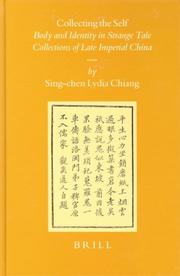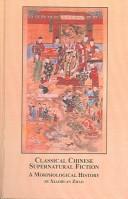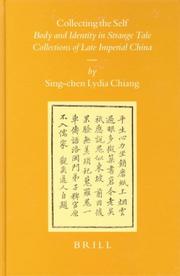| Listing 1 - 5 of 5 |
Sort by
|
Multi
ISSN: 18788084 ISBN: 9004216286 9789004216280 9789004250321 9004250328 1299735991 Year: 2013 Volume: v. 3 Publisher: Leiden
Abstract | Keywords | Export | Availability | Bookmark
 Loading...
Loading...Choose an application
- Reference Manager
- EndNote
- RefWorks (Direct export to RefWorks)
Although the preface says that the tales in this collection of supernatural stories should not be taken seriously and just aim to dispel boredom, Zibuyu is a work with different reading levels, which allows to uncover several deep trends, taboos and fantasies of late imperial intellectual circles. Disgust, surprise and laughter are constantly evoked, by continually attracting and repulsing the reader. Yuan Mei’s approach guides the reader to an adventure in the dangerous recesses of the self. It is a sort of allegoric fantastic reflection on the relative and polyphonic essence of human beings, the multiplicity of selves from psychological perception, and a challenge to the traditional biographical and historical perspective for the unreliability of destiny. Dreams, madness, delusions and other extreme cognitive and affective conditions, abnormal events, gods and spirits, and the dark world of death lead to a reversal of perspective and destroy the Apollonian vision of the social-centered Confucian orthodoxy. With introduction, translation and comments.
Horror tales, Chinese. --- Short stories, Chinese. --- Chinese short stories --- Chinese horror tales --- Chinese fiction
Book
ISBN: 9789004250321 9789004216259 9789004216266 Year: 2013 Volume: 3 Publisher: Leiden [etc.] Brill
Abstract | Keywords | Export | Availability | Bookmark
 Loading...
Loading...Choose an application
- Reference Manager
- EndNote
- RefWorks (Direct export to RefWorks)
S16/0416 --- China: Literature and theatrical art--Traditional novels: Pre-Tang and Tang: studies, texts and translations --- Horror tales, Chinese. --- Short stories, Chinese. --- Horror tales, Chinese --- Short stories, Chinese --- Chinese short stories --- Chinese fiction --- Chinese horror tales

ISBN: 9789047414841 9789004142039 Year: 2005 Publisher: Leiden;Boston BRILL
Abstract | Keywords | Export | Availability | Bookmark
 Loading...
Loading...Choose an application
- Reference Manager
- EndNote
- RefWorks (Direct export to RefWorks)
Chinese strange tale collections contain short stories about ghosts and animal spirits, supra-human heroes and freaks, exotic lands and haunted homes, earthquake and floods, and other perceived "anomalies" to accepted cosmic and social norms. As such, this body of literature is a rich repository of Chinese myths, folklore, and unofficial "histories". These collections also reflect Chinese attitudes towards normalcy and strangeness, perceptions of civilization and barbarism, and fantasies about self and other. Inspired in part by Freud's theory of the uncanny, this book explores the emotive subtexts of late imperial strange tale collections to consider what these stories tell us about suppressed cultural anxieties, the construction of gender, and authorial self-identity.

ISBN: 0773460977 Year: 2005 Publisher: Lewiston Mellen
Abstract | Keywords | Export | Availability | Bookmark
 Loading...
Loading...Choose an application
- Reference Manager
- EndNote
- RefWorks (Direct export to RefWorks)
Chinese fiction --- Chinese language --- Fantasy fiction, Chinese --- Ghost stories, Chinese --- Horror tales, Chinese --- Supernatural in literature --- History and criticism --- Morphosyntax

ISBN: 9004142037 9047414845 Year: 2005 Volume: 67 Publisher: Leiden ; Boston Brill
Abstract | Keywords | Export | Availability | Bookmark
 Loading...
Loading...Choose an application
- Reference Manager
- EndNote
- RefWorks (Direct export to RefWorks)
S16/0195 --- S16/0440 --- China: Literature and theatrical art--Thematic studies --- China: Literature and theatrical art--Traditional tales and short stories (incl. Zhanguoce; Liaozhai) essays, letters, prose: studies --- Body, Human, in literature. --- Grotesque in literature. --- Horror tales, Chinese --- Human body in literature. --- Identity (Psychology) in literature. --- Short stories, Chinese --- History and criticism. --- Pu, Songling, --- Yuan, Mei, --- Ji, Yun, --- Grotesque in literature --- Human body in literature --- Identity (Psychology) in literature --- Chinese horror tales --- Chinese fiction --- Body, Human, in literature --- Human figure in literature --- History and criticism --- Yüan, Mei, --- 纪昀, --- Chi, Yün, --- Pʻu, Sung-ling, --- 蒲松龄,
| Listing 1 - 5 of 5 |
Sort by
|

 Search
Search Feedback
Feedback About UniCat
About UniCat  Help
Help News
News